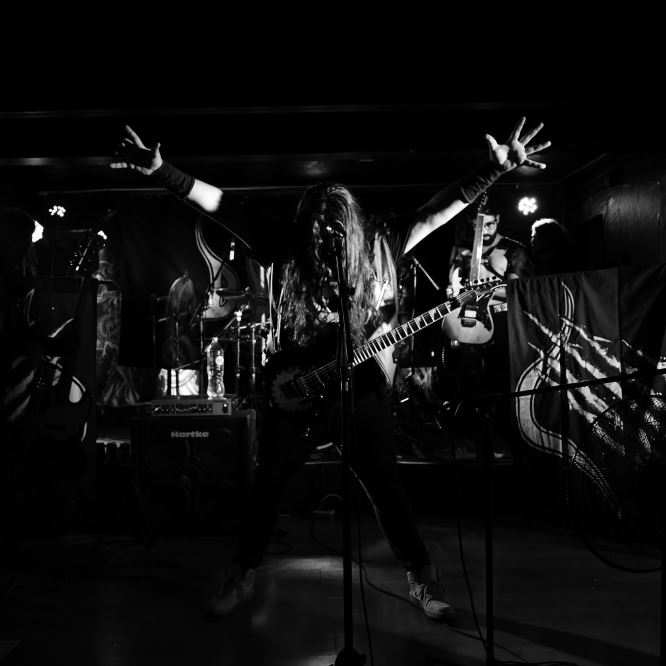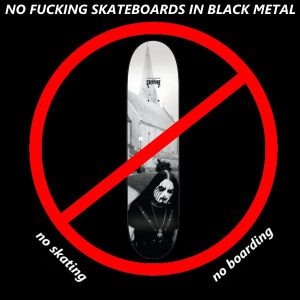Attentive readers of Bagnik Zine know that I consider Chile to be the best country in the world in terms of metal. Recently, after listening to the second album of the magnificent project VÓRTIZE, I realized that I had never had a serious conversation with Chilean musicians before, and decided to fix it. Without wasting any time, I wrote to Javier Ortiz from VÓRTIZE and sent him a list of questions. Javier didn't waste any time either: he sent the answers after 3 hours (!!!), and this is an absolute record that hardly anyone will beat. Let's get acquainted with true Chilean metal!
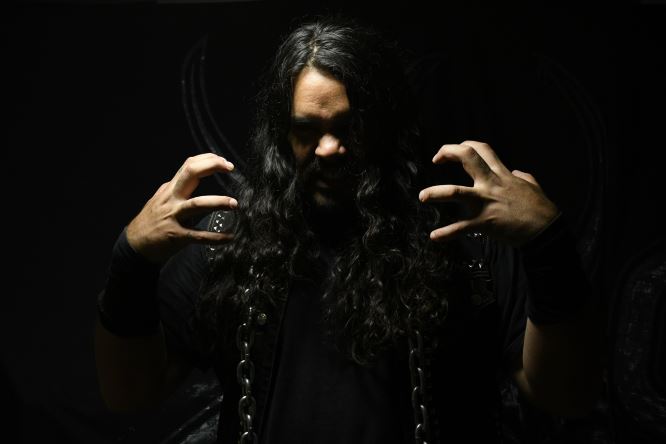
Greetings from Belarus, Javier! First and foremost, tell us about yourself. What was your gateway to heavy music? How did you become a musician? What bands influenced you the most?
Хаўер: Greetings Raman and thanks for the interview. Well, I started listening to metal from a very young age (8 years old) due to the influence of my older brothers, who in the years 1997-2000 listened to a lot of Metallica, Pantera, Guns n Roses, etc. Therefore, from a very young age, I discovered Metallica and it was undoubtedly the band that encouraged me to learn more about this musical style.
Let’s discuss your bands. Judging by the information on Metal Archives, you started as lead guitarist in the band called Thrashazo. This band released only one demo in 2010, and no one from its line-up, except you, played in other bands since then?
J: Thrashazo was the first metal band I ever made with my friends, it was where I started making my first compositions. The band was created without any major pretensions, at that time the only thing important was to drink a lot of alcohol and play thrash metal, which is fine for a while, but I needed something more serious.
At the same time, you created your own Black / Thrash Metal project Maleficum Strike that released only two demos. I couldn’t find these records online; can you tell me what kind of band it was? Why it wasn’t continued?
J: That's right, during the transition period between Thrashazo and the creation of Demoniac, I created a solo project called Maleficum strike, which would be like a pre-Demoniac band, but I didn't want to make music alone, I wanted a band and to play live music, traveling, you know, living the dream, hahaha.
I realized that I needed to put together a band with real people, and when I got together with those people we decided to name the band Demoniac and Maleficum Strike was forgotten, and the songs I had for Maleficum Strike were part of Demoniac's first release.
In 2012, you became a guitarist of classic Thrash Metal band Terror Strike (the one with quite eloquent lyrics; I wonder if you guys had problems after “Child Rape” song, haha). It seems that it was very active both in terms of recording and live performance, but there were no new releases since 2016. Tell us a little about this band.
J: Yes, in 2012 I joined the band Terror Strike as a guitarist, that band had already been playing for several years in the underground circuit and was quite active. At that time there were no problems with the lyrics because the truth is that no one bothered to translate the lyrics and know what the topic was really about, and to be honest I didn't even know what the lyrics were about, the truth is I never I understood well those lyrics that the band's drummer wrote at that time. Unfortunately I had to leave Terror Strike in 2020, due to lack of time and prioritizing my work and personal projects. But until now the band is still active, with long periods of inactivity, but active nonetheless.
Demoniac: your most well-known band where you took a leading role as a guitarist and a vocalist. Tell us about the ideas you had in your mind when starting this band. Did you know about other bands with the same name at that time?
J: Well, the initial idea of creating Demoniac comes from when I was a child and frontman like James Hetfield, Max Cavalera, and Chuck Schuldiner always caught my attention. I felt very attracted to these characters and the role they played within their bands: playing and singing at the same time, and also being the creative minds, that caught my attention a lot and was the fuel for me to also fulfill that role within Demoniac.
Regarding the name, initially the name went through several mutations, from Demoniac Possession, to Demoniac Messiah, until we finally simplified it to Demoniac. And we didn't care that there were more bands in the world with the same name, as long as in Chile we were the only ones with that name.
Demoniac started as typical South American Blackened Thrash Metal force with Satanic lyrics and ultra-fast songs. But after some time, it evolved into something far more creative and unusual. While the main foundation of the songs remained more or less the same, you gradually added more melodic, progressive, technical, even jazzy elements (I ask readers of Bagnik Zine not to be scared, all this is very well integrated into proper metal). Also, since the second album (if I’m not mistaken), you added… clarinet, which is the instrument I definitely did not expected to hear in this genre! The songs also became longer and more complex (the final song on “So It Goes” is almost 20 minutes long). Simultaneously, the lyrics became more complex and psychological as well. What influenced these unusual decisions?
J: The evolution that the band has had over time has been gradual and has to do with the maturity that one acquires over the years, as one discovers new music, opening oneself to new musical aspects, at the same time applying them to the compositions, it is true that over the years the songs have become more complex and strange, but that is to make it more fun, as a composer I need to always be in search of a new sound or ways of creating songs, and it is also a stimulating challenge to create complex songs that are out of the ordinary.
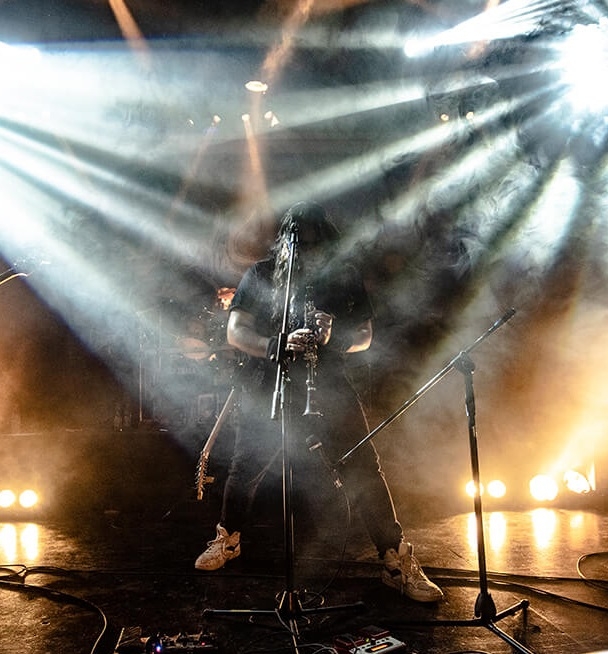
On the second album, you started your transition to Spanish-language lyrics, and on the newest album “Nube Negra” (and in Vórtize) you sing in Spanish only. There is an opinion that bands singing in generally English have more chances, because they are more accessible to international audience. Personally, I think this is bullshit, because most nowadays listeners are “content consumers” that never read lyrics anyways, but also because singing in your mother language is always natural and sincere, and being sincere is a cornerstone of the underground metal. What do you think of it, and why you decided to abandon English language in Demoniac?
J: The truth is that since I started creating songs they were in Spanish, Thrashazo's lyrics were in Spanish, in Demoniac's first release there is a song in Spanish, in Maleficum strike there were also songs in Spanish. The intention of singing in Spanish has always been there, it's just that I felt like it didn't come out very well. Over the years I improved and decided to create lyrics only in Spanish, so that the listener understands what they hear, when one understands what they hear it is definitely another experience and the songs take on another meaning. Furthermore, I am a great lover of music in Spanish.
On to Oldeath. This is relatively young band (2019-), where you play drums. Tell us about your involvement in this band and the ideology behind Oldeath. Did you write any songs for it? Because I can swear that I heard some of your guitar style in it.
J: Oldeath is a black metal studio project that I created with a friend named Roberto Monardes. We are both in charge of the song compositions, and I am also in charge of the drums, some guitars and the production of the albums. This band was created without great pretensions other than the pleasure of creating black metal and nothing more, we have released 2 LPs that have had great acceptance within the Chilean underground scene.
Finally, let’s talk about Vórtize, this wonderful project of yours that made me pay attention to all your music in the first place. It seems to be your most intimate creation so to speak, because on the first album, “¡Tienes que luchar!”, you did everything by yourself – all instruments, all songs. Your promo pictures for Vórtize demonstrate you as multi-handed entity; so how did you learn to play all these instruments so well? :)
J: Making songs has always been my favorite hobby, and there was a time when I started listening to a lot of heavy metal in Spanish and the idea of creating a heavy metal project in Spanish arose. I have never really liked depending on other people to make music and vortize was born as a solo project precisely for that reason, a place where I don't have to depend on anyone's motivation but myself. To record this album I had to go through many inconveniences and learn many things, creating that album was like a school for myself. As of today, I am about to release the third album of this project with which I feel very happy to have created and allows me to expand my creativity much more.
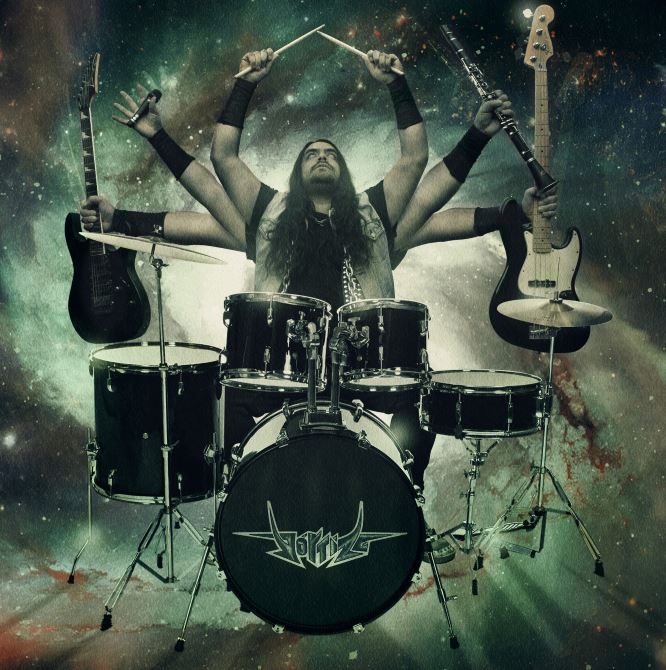
What is the idea behind Vórtize? From the lyrical point of view, as I understood reading the lyrics, this project is a kind of an outlet where you can speak about anything you want? From the musical point of you, do you have any goal, like, to represent some certain periods / styles of Heavy Metal, or you just play it as you feel it?
J: That's right, as you say, it's a place where I can talk about whatever I want, from my musical point of view, and I don't try to represent any style or anyone or anything in particular other than doing what comes from my heart and nothing more. I approach it how I feel it .
“¡Tienes que luchar!” sounds as if it was recorded somewhere in time the beginning of 1980s on a full analog studio, and this sound, in my opinion, is perfect. How did you manage to create it?
J: That album was recorded precariously, in my house, I think that if it has that supposedly eighties sound it is because of the low quality with which it was recorded [if modern Heavy Metal had such a "low" quality of recording, it would've been much more interesting to listen to - F1sher16]. At that time I didn't have more resources or the experience to sound better. As I told you before, creating Vortize was like a school for me, and it was also in the field of music production, producing the first Vortize album taught me how to record, edit, equalize, how to mix, etc. things that I did not know until that moment and that today are fundamental when producing a studio album.
“Desde bajo tierra”, the second album, is a bit different in terms of approach. On this album, some lead parts were performed by guest musicians. And the number of guests is 8 against 5 on the debut album, which makes an impression as if “Desde bajo tierra” was kind of a superalbum that united quite a few prominent figures of Chilean scene. Did these people wrote something for the album, or you wrote everything by yourself again?
J: Vortize's second album sounds much better, I already had more experience, on this album there are 3 collaborations and the collaborations were written together, that was the idea, and it came out quite well, the collaborations were with Poder Mortal, Despertar and Transcendencia, Chilean Heavy Metal bands.
Also, tell us a little about these guest musicians, especially about Romi Huerta Núñez, whose memorable voice adorned both albums of Vórtize.
J: Regarding the guitar solos, I have had the participation of several friends from the scene, since I am not very good at doing guitar solos. and Romina is my cousin, we have known each other all our lives, she has an incredible voice and I feel very privileged to have her voice in Vortize's songs. I am very grateful to each person who has collaborated and participated in a vortize song, I like to get to know them and capture their personalities in each song.
Does Vórtize play live?
J: I don't know what will happen in the future but for the moment I will say no, since putting together a band requires a lot of work, time and dedication. And the initial idea of creating vortize as a solo project is not to depend on anyone, so I prefer to keep it that way, but, you never know.
Share your musical plans for the nearest future.
J: The plans are to always be working on new music, composing new songs, releasing more albums, creating a lot of discography, playing live, etc. With vortize I hope to release one album per year, I already have the third album almost ready, and with demoniac we hope to have a new album by 2025.
Most records of Demoniac, Oldeath and Vórtize were released by Nube Negra Prods. Is this your label? If yes, tell us more about its history and goals.
J: That's right, Nube Negra Prod is a record label that I founded together with Demoniac bassist Vicente Pereira. Through that label we are in charge of launching our own music, my bands and also launching bands from the Chilean national scene, we have already had several releases and we have positioned ourselves within the local scene as an underground label. The main objective is to release our own music through the label and also support local bands that need to release their music.
About the labels: your albums were released by various labels from South America, Europe and USA. How’s your general experience with them, did you have any unpleasant situations? Do you feel that your bands have many fans abroad?
J: We have had good experiences with the labels we have worked with, fortunately, we have never had any problems, and I do think that my bands are heard a lot outside the country and that is very good, through the label we sell music to the whole world. I think Chilean metal has a lot to offer and should be listened to more.
Now, since you’re the first Chilean musician I’ve ever interviewed, I would like to talk about more wide topics concerning Chile and some other things. Have to admit, I know very little about Chile. But what I can say for sure (as a label worker and a very, very experienced reviewer / author) that I consider Chile to the be the best metal country in the world. In all my years, I have never ever heard a bad band from Chile, and only a couple of mediocre. Almost everything I’ve heard from Chile is top-notch extreme metal with authentic sound and aesthetics of the golden era, created performed on the highest levels of skill and dedication. What do you think of your country’s metal scene? What bands would you recommend?
J: Yes, there is no doubt that Chile is a land of metals, Chile is a great exponent of metal and is in a very active moment. Many international metal bands like to come to Chile because the public here is very crazy and passionate. A Chilean band that I recommend listening to is Mental Devastation, they make very good technical thrash metal, and they have grown with us, another band that released an album recently and I really liked it is Necrolatria.
South / Latin American countries are considered very violent by us, Europeans, and, as I heard, both metal fans and musician still kick posers’ asses from time to time – a great tradition that, unfortunately, is lost in most places nowadays. In general, how violent is Chilean metal scene? Did you have any hot gigs with broken chairs and windows and bloodied noses etc?
J: Yes, the underground scene is very hostile, the moshes are very violent and there are always fights at shows. but at the same time there is a great camaraderie between bands and there are many good friends with whom to share a beer or exchange some tapes, the truth is that you see everything, the good, the bad, the beautiful and the ugly.
Most South American countries are very religious, but, as far as I know, Chile is a secular state, so it’s not really fervently Christian. What is the general opinion on metalheads among the common citizens? Do you have any problems, like being labeled as dangerous Satanists, “extremists” and so on?
J: Chile in the 80s and 90s there was discrimination against metalheads and satanic bands. Nowadays people don't care, there is no longer that discrimination towards metalheads, or towards any style. Everyone can be what they want to do as long as you don't bother others. At least that's how I see it, but the world is so big and there are so many people that everything could be happening right now.
Tell me a bit more of Chile in general. Is it a good country to live in? What do you like and hate about it the most? Since Chile looks a bit like a very long stripe, it must be very different geographically (colder southern regions, warmer northern regions)? What are your favorite places in Chile?
J: Chile is a very beautiful country, geographically it has a little bit of everything, from the coldest fields to the driest desert, I live in the central area of the country, specifically in the Valparaiso region, It's a pretty quiet place to live. I think the only problem with living in Chile is that we are far from everything, we live at the end of the world, isolated by the mountain range, the Pacific Ocean and the desert, which makes us very disconnected from everything. Now in the age of the internet we are more connected with the world, but not before, and that has greatly influenced the culture, we have been late to everything because we live far from the empire, perhaps that is why in 2024 I am making Thrash metal...
What Chilean food would you recommend?
J: The Chilean food that I recommend is called ''Porotos con riendas'' [literally, "beans with reins" - F1sher16]. . It is a type of bean cooked with pumpkin, spinach and noodles, a true ambrosia from the kitchen of the gods of Olympus.
I don’t know if you heard of it, but my compatriot Ignat Damejka (Ignacio Domeyko) is a national hero of Chile. Do you know anything about Belarus? Maybe you’ve listened to some Belarusian bands?
J: To be honest, and with great respect, I don't know anything about Belarus. I only know that the country exists from what I have read about history, and the war conflicts that have occurred in Europe, but I don't know anything about its music and culture, I would like to know more about that now that the opportunity arises. For me it is incredible that people from Belarus are interested in my music and it is an honor to answer this interview for all of you and to be able to reach places where I never imagined, I definitely want to know more about Belarus and its metal scene.
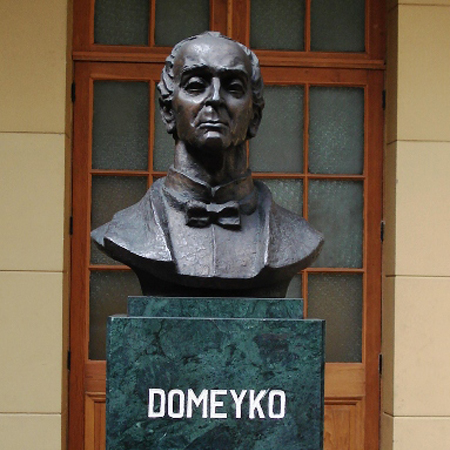
That will be all; thank you for your time and great music! As always in the end, if you wanted to say something else to the readers, I am happy to give you this opportunity:
J: First of all, thank you Raman for the interview, very good questions, I had a lot of fun answering them, I hope my English is not so terrible. Thank you for the interest that has been generated by Demoniac and Vortize in Belarus, it is truly something that I never imagined would happen, there you can see that music and metal is a universal language that surpasses all borders, cultures and ideology, metal It is a feeling that is lived. I hope I can someday go and play our music in Belarus, that would be crazy.

